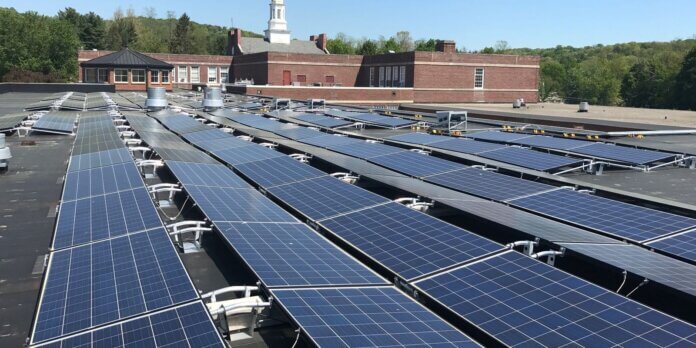The New York Power Authority (NYPA) and the New York City Department of Citywide Administrative Services (DCAS) have unveiled plans for the installation of up to 16 MW of solar energy on the rooftops of 46 New York City public schools and several New York City Department of Environmental Protection (DEP) sites, including its Wards Island Wastewater Resource Recovery Facility.
“With this significant solar project, all at New York City-owned facilities, we will, together, boost the renewable resources in the city’s energy supply and move the city and our state closer to accomplishing the ambitious clean energy goals we have set for ourselves,” says Gil C. Quiniones, president and CEO of NYPA.
“Integrating solar systems into community facilities throughout the five boroughs and turning underutilized spaces into green opportunities is a smart way to practice sustainability and push forward our long-term commitment to help build a cleaner, greener energy system for all New Yorkers,” she adds.
The school sites are located in racially and economically diverse neighborhoods throughout all five boroughs and were chosen based on the technical viability of installing solar technology on their roofs.
The city enlisted NYPA’s support on this initiative to help achieve Mayor Bill de Blasio’s goal of installing 100 MW of solar power on public buildings by 2025 and reducing citywide emissions 80% by 2050. The initiative will help achieve Governor Andrew M. Cuomo’s statewide goal of having 70% of New York’s electricity come from renewable sources by 2030.
NYPA is asking developers to submit proposals to design, construct and own solar PV systems at 50 sites throughout the five boroughs. NYPA will select the developers, manage the project and arrange 20-year power purchase agreements for DCAS and DEP to buy the electricity output from each of the projects at competitive prices. The due date for responding to the request for proposals (RFP) has been extended until August 7.
The solar systems, which have the option of including energy storage, are planned to be constructed on 46 schools run by the Department of Education and account for about 11 MW of new power generation. Several sites managed by DEP, including the Wards Island plant along the East River in upper Manhattan, will account for the additional 5 MW.
At Wards Island, a combination of ground mounted, carport, rooftop and elevated canopy solar PV systems will be installed throughout the eight-facility complex totaling up to 4,843 kW DC of solar PV capacity. Power generated will serve the loads of the plant and a potential battery energy storage system which could reduce demand charges.
As part of the overall project, more than 1 MW of solar arrays will also be installed at the Catskill/Delaware Ultraviolet Light Disinfection facility in Valhalla and at wastewater resource recovery facilities in Pine Hill and Margaretville.
The project will incorporate a new power source into the school districts’ infrastructure and allow the city to purchase power generated on site instead of purchasing power from a utility which may or may not be from a renewable source.
The solar systems will accelerate progress under the state’s Climate Leadership and Community Protection Act (CLCPA), the most ambitious emissions-reduction legislation in the nation, which calls for 6,000 MW of distributed solar by 2025 and 3,000 MW of energy storage by 2030 and also support the state mandate for a 100% carbon-free electricity sector by 2040.
The city and the NYPA conducted site assessments to identify the most feasible and appropriate locations to install solar PV systems to help the city achieve its renewable goals. Selected locations also support the city’s efforts to advance environmental justice as many of the sites are in areas with poorer air quality and lower median incomes. The project sites are anticipated to be interconnected behind the meter to the buildings’ electrical systems.
Development work on the projects is anticipated to commence later this year when a developer(s) is selected. Operation of the systems is expected to come online throughout 2021 and 2022.
Photo: A rooftop solar array at Somers Middle School




